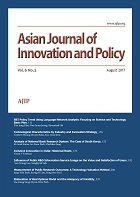 ISSN : 2287-1608
ISSN : 2287-1608
Principles and Methodologies for STI Strategy Development: Experience and Best Practices from the Republic of Korea
Abstract
This paper articulates the STI strategy development principles and methodologies that have been elaborated through iterative processes of STI strategy development cases for the past ten years. The consultation cases include poverty traps in Nepal and Laos, African health challenges in Nigeria and Tanzania, and ASEAN global challenges in Indonesian Water, Vietnamese Green Energy, and Filipino Food, in partnership with some multilateral agencies.The iterative elaboration process has continued with consultation activities on Thailand and on Cambodia, Laos and Myanmar in planning partnership with Thailand. The principles were originally conceptualized from the benchmarking process of the Korean STI development experience. They were further incorporated as methodologies with which relevant planning bodies are guided to address individual and regional challenges through science, technology and innovation strategies. The methodologies are strong in providing plausible holistic perspective scenarios by which various stakeholders can be engaged in the planning and implementation process. But it is heuristic in nature and can be learned only through on-the-job training process. This is the structural limitation for scaling up.
- keywords
- Principles, methodologies, STI strategy development, benchmarking Korean experience, planning partnerships
Reference
Choi, H.S. (1988) Springboard Measures for Becoming Highly Industrialized Society, APCTT/UNESCAP.
Clar, G. (2018a) Roadmapping and its role in the strategy cycle; basic principles and their application to a regional innovation system embedded in global value chain, Presentation material, International Consultation and Capacity Development and International Benchmarking Workshop, January 22 to 24, Bangkok.
Clar, G. (2018b) Strategic program design and taking advantage of strategic programs for optimizing return on investment and societal impact, Presentation material, International Consultation and Capacity Development and International Benchmarking Workshop, January 22 to 24, Bangkok.
Doner, R.F. Schneider, B.R. (2016) The middle-income trap: more politics than economics, World Politics, 68(4), 608-44.
Kim, S.Y., Baik, Y.J. and Park, Y.R. (2015) The historical review of the semiconductor industry, Journal of the Korean Academy of Business History,30(3), 145-166.
Lee, J.H. (2011a) Smart specialisation: concept and framework, STEPI Policy 2011-24.
Lee, J.H. (2011b) Issues and policies in the STI leadership phase, STI Policy Review, Winter, 2(4), 29-38.
Lee, J.H. and Saxenian, A. (2013) South Korea: strong state, large diaspora, weak search networks, Kuznetsov, Y. (ed) How Can Talent Abroad Induce Development at Home? Towards a Pragmatic Diaspora Agenda, Brookings Institution Press, 267-288.
Lee, J.H., Charoenchongsuk, N. and Jutarosaga, A. (2017) Human resources system cultivation for Thailand’s future industries, STIPI Strategy Paper 2017-04.
Lee, J.H., Hwang, Y.S., Kim, S.H. and Kim, J.S. (2008) Technical assistance for the 5-year S&T plan in Vietnam, UNDP.
Lee, J.H., Maliphol, S. and Yang, F. (2013) Innovation system diagnosis and STI strategy development: the case of Nepal, Policy Research 2013-24-02, STEPI.
Lee, J.H., Maliphol, S. and Kang, H. (2014) STI Strategies for Poverty Reduction: The Case of Lao PDR, Policy Report 2014-12-31, STEPI.
Lee, J.H., Maliphol, S. and Kim, K.O. (2015) STI strategies and action planning in ASEAN, STEPI.
Lee, J.H., Maliphol, S., Sun, J., Yang, F. and Dong, G. (2013) Diagnosis and Solutions for STI Strategy Development: ASEAN Global Challenges and African Health Innovation, Policy Report 2013-24-01, STEPI.
OECD (2014) OECD Reviews of Innovation Policy, Korea.
Popper, R. (2008) Foresight methodology in Georghiou, L., Harper, J.C., Korean, M., Miles, I. and Popper, R. (ed.), The Handbook of Technology Foresight Concepts and Practices, Cheltenham: Edward Elgar, 44-88.
- 67Downloaded
- 177Viewed
- 0KCI Citations
- 0WOS Citations

